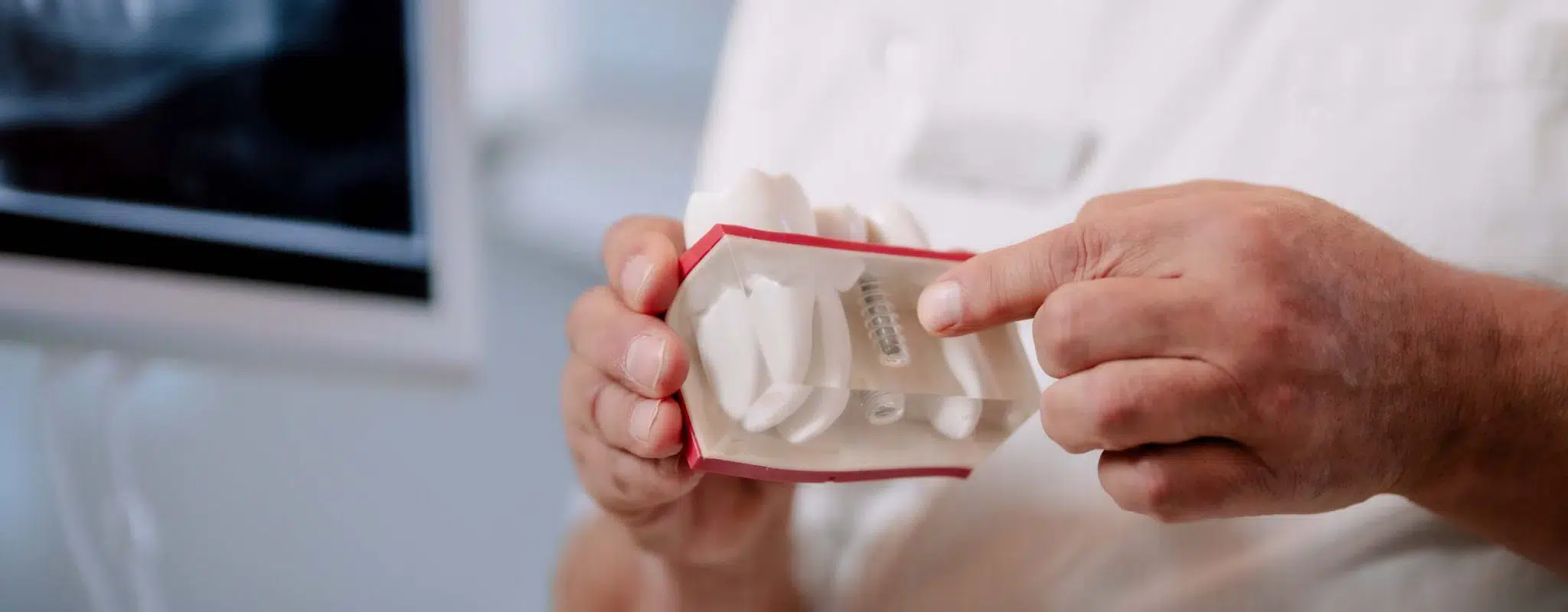A quicker and more effective way to implement tooth implants
In the event that you require your natural teeth to be replaced with tooth implants. Lassus Tandartsen has in-house expertise in all technical developments and innovations in the area of Implantology in-house. This ensures that implants can be placed in a timely and cost-effective manner.
Why have tooth implants at Lassus Tandartsen Tilburg?
- Use of CBCT scan (three-dimensional scanning)
- High-quality implants from Thommen Medical Straumann
- Personal treatment plan
- NVOI recognized implantologists
Tooth Implants The treatment
Below is a short overview of the steps involved in placing implants:
- A consultation and assessment of your health
- Diagnosis through the use of a CBCT scan
- Placing of the implant(s)
- After 7-10 days removal of stitches and review of the status of the recovery process
- After 8-12 weeks the placing of a crown, prosthesis or bridge
Which Tooth Implants Are Best For Me?
At Lassus Tandartsen we work with titanium and zirconium implants.
Titanium
Titanium implants are a type of screw-like artificial root that is placed in the jawbone. Rejection of this type of implant is extremely rare unless the client is allergic to metals. It’s also very long-lasting with a lifelong guarantee.
Zirconium
Zirconia is an incredibly strong, solid all-ceramic material widely used to create crowns and bridges. The use of Zirconia for tooth implants is a holistic option. Cosmetically, it’s a better solution than titanium due to its natural white appearance. It’s particularly suitable for replacing front teeth.
Consultation
You’re welcome for a consultation with an implantologist to discuss the options and possibilities for implants. During the consultation, we’ll make an assessment of your health. Your overall health, use of medication, allergies and any medical issues or complications by earlier dental treatment will be discussed.
Diagnosis
In order to make a good diagnosis, in most cases, we use a CBCT scan. This provides the implantologist with a three-dimensional image of the teeth from which they can determine if an implant is the best solution. The implantologist pays particular attention to the quantity and quality of the jawbone present in the scan.
The placing of implants
Implants are placed under local anaesthetic. After this, a temporary healing cap is applied to the implant. After 7 to 10 days you’ll return to the practice to have the stitches removed. The implantologist will also investigate the status of the healing process.
The overall healing process takes roughly 8 to 12 weeks. It’s dependent on the quality and amount of jawbone and the individual medical situation. During this period it’s important to clean your teeth well.
The Application of a crown, prosthesis or bridge
Once your gums heal, you’ll have more impressions made of your mouth and remaining teeth so that the definitive crown, prosthesis or bridge can be made and placed in your mouth.
Regular checkups and aftercare are necessary in order to be able to maintain the optimal condition of your gums and crown. This way you can ensure that your implants will have a longer usage period.
FAQ
Is the treatment painful?
You don’t have to worry about extreme pain during the placing of implants. Local anesthetic is used to anesthetize your teeth, thus keeping any pain caused by the process to a minimum. Major treatment is usually carried out under local anesthetic.rnrnIt’s highly likely that you’ll experience pain after treatment, for which painkillers will be prescribed.
How long will implants last?
Implants in the lower jaw last longer than those in the upper jaw. This is due to the bone structure in the upper jaw not being as strong. Implants typically last for more than 25 years. The lifespan depends on how well they are looked after. It’s critical to keep implants clean in order to extend their lifespan. We advise you to also have a yearly checkup by your dentist and dental hygienist.
Can an implant be rejected?
An implant is a type of screwlike artificial root made from titanium that is placed in the jawbone. Titanium is almost always accepted by the jawbone and surrounding gums and is usually not rejected.
What must I pay attention to after treatment?
We advise that after the treatment to keep any contact with the area around the implantation to an absolute minimum. It’s also important to avoid the use of alcohol for the first two weeks after treatment. We also advise you to completely stop smoking during this period.
The Cost of Tooth Implants
In the table below are the costs for the most common treatments:
| Code | Treatment | Rate |
|---|---|---|
| X22 | Making and evaluating panoramic X-ray for the purpose of dental implants in a toothles jaw | €84,48 |
| J001 | Overhead costs implants and peri-implantitis surgery | €213,70 |
| J010 | Examination for the indication for implantological treatment | €78,06 |
| J040 | Placing first implant, per jaw | €275,00 |
| J057 | Implant costs | €387,76 |
**Excluding 21% VAT
Reimbursement by health insurer
The costs of implant treatment, are only covered by the basic insurance policy in the event of serious developmental disorder or growth disorder. If you have additional dental insurance, implants are often reimbursed by the insurer. We advise you to always contact your health insurer to see if they will reimburse you for the cost of implants.
